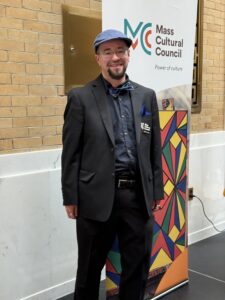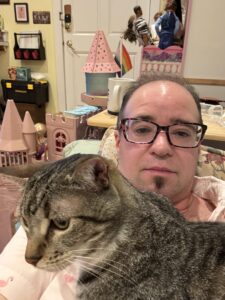The theme this month is that there is no theme.
My fellow midlife transitioner, Jude Ellison S. Doyle, has written an excellent new book with the waggish title of DILF: Did I Leave Feminism? (Penguin Random House, 2025) Part memoir-in-essays and part cultural criticism, DILF covers the fraught but inseparable relationship between transmasculine people and feminist movements. A prominent feminist cultural critic before his transition, Doyle found that his experience was erased or his credentials questioned in spaces he had once fought for, even while he remained subject to patriarchal oppression as a gender minority. The book weaves personal anecdotes with important reassessments of Second Wave thinkers, recovering a complex historical record that reveals the gender essentialism of contemporary TERFs as a deviation from the movement. Read an interview with him at Assigned Media, “Jude Doyle on Manhood After Patriarchy”:
I think that if we view feminism as the struggle of gender-marginalized people for bodily autonomy, rather than just calling these things “women’s issues,” then we make room for all trans people within feminism. We can state that the right to change sex is a bodily autonomy struggle. It is regulated in the same ways that things like abortion have historically been regulated. It is opposed by the same people. They really strongly want to link us to our reproductive anatomy and say that that defines us. That this is the only thing we can ever be, and that our lives essentially need to be run by it. Taking it to a bodily autonomy front leaves room for all trans people to participate, particularly transmasculine people.
I think it would also help tremendously if we recognize that sexual violence is routinely wielded against anyone who steps out of line within patriarchy. We have a really essentialized view of who a victim is and who a perpetrator is, and really often that leaves sexual violence survivors who aren’t young cis women out of the picture. It’s intensely harmful, when you look at the sheer rate of sexual violence in the trans community.
This essay on his blog, “DILF Redux: TERFs, Transmascs, and Two Steve Feminism,” is a good sample of the book’s arguments and his reasons for writing it.
Do I want to be seen as just another guy? Sometimes. Maybe. It would be a start. Does it make sense, sociologically, to interpret me as “a guy” in a way that implies a cis life history, dominance within patriarchy, or even just being seen and treated as a man on a daily basis? Not really. Yet most people who do this think they are affirming my gender — or, at least, they tell themselves they are.
There are two things I want to impart here, at the beginning of what threatens to be a long essay: First, your experience of gendered oppression is not necessarily about who you are. It’s about what people think you are, or what people have been primed to see when they look at you. Second: What cis people tell themselves they are doing, in regard to a trans person’s gender, is often very different than what they’ve done.
Award-winning poet and social media sage Richard Siken was recently the featured poet at Only Poems, with an interview and excerpts from his new collection of prose poems, I Do Know Some Things (Copper Canyon Press, 2025). Siken explains why he switched to this poetic form after suffering a stroke: “The line break is part of the lyric gesture. You can’t sing without a body. I didn’t have a body, not a reliable one.”
Around Halloween, Harvard Magazine’s website featured a 1986 article from its archives, “The Secrets of Haiti’s Living Dead”. It profiled anthropologist and ethnobotanist Wade Davis’ investigation of the science behind the zombie legend. He did in fact find a compound that, mixed with other ingredients, would slow a person’s metabolism enough that they appeared dead and were buried, later to be dug up and forced to work for the enemy who had poisoned them. But science alone didn’t explain the zombie phenomenon. The “resurrected” poison victims accepted their enslavement because of their shared social beliefs.
Davis was certain he had solved the mystery. But far from being the end of his investigation, identifying the poison was, in fact, its starting point. “The drug alone didn’t make zombies,” he explains. “Japanese victims of puffer-fish poisoning don’t become zombies, they become poison victims. All the drug could do was set someone up for a whole series of psychological pressures that would be rooted in the culture. I wanted to know why zombification was going on,” he says…
…Davis’s investigations uncovered the importance of the secret societies. These groups trace their origins to the bands of escaped slaves that organized the revolt against the French in the late eighteenth century. Open to both men and women, the societies control specific territories of the country. Their meetings take place at night, and in many rural parts of Haiti the drums and wild celebrations that characterize the gatherings can be heard for miles.
Davis believes the secret societies are responsible for policing their communities, and the threat of zombification is one way they maintain order. Says Davis, “Zombification has a material basis. but it also has a societal logic.” To the uninitiated, the practice may appear a random criminal activity, but in rural vodoun society, it is exactly the opposite—a sanction imposed by recognized authorities, a form of capital punishment. For rural Haitians. zombification is an even more severe punishment than death, because it deprives the subject of his most valued possessions: his free will and independence.
For other spooky news from my alma mater, check out this Harvard Magazine article on an exhibit of Edward Gorey’s drawings that ran at Houghton Library, the college’s rare books archive.
But for real-life horrors, it’s hard to beat the zombifying experience of a customer service phone call to a large corporation, as Ron Currie Jr. depicts in his short story “Conversations with Various Time Warner Cable Technical Support Reps, 8 p.m. to 3 a.m.” at MonkeyBicycle.
Me: I’m trying to figure out why I can’t get the HD broadcast of the basketball game.
TWCG: Let me check that for you.
Me: Thanks.
TWCG: …
Me: …
TWCG: I see here that you don’t have a set-top box.
Me: No.
TWCG: Well, to access those channels, you need the box.
Me: Even though those channels are included in the service I’m already paying for, and my television is perfectly capable of processing an HD signal on its own.
TWCG: You need to have the box to access those channels.
Me: Let me guess—you charge more for the box.
TWCG: Yes. It’s ten dollars a month.
Me: I have to say, it really bothers me that you’re pretending this is some kind of hardware issue. I mean, I already get the HD broadcasts of the major networks just fine. It’s not like my TV is a Trinitron, man.
TWCG: But the channels you’re trying to access require a set-top box.
Me: You can keep repeating the same thing if you like, but that doesn’t mean it makes any sense.
It only gets worse from there. Need something to read while you’re on hold? I highly recommend Currie’s mystery novel The Savage, Noble Death of Babs Dionne.
On a more upbeat note, programmer and social scientist Dave Guarino at Asterisk Mag explains “How to Make a Great Government Website” based on his redesign of California’s portal for accessing SNAP benefits. Many people who are entitled to government benefits don’t receive them, because of cumbersome and poorly designed application processes.
There are two other two big barriers I want to mention because I think they’re particularly relevant right now. First is the required interview. Most of the time it’s a phone call. Often they’ll call from a blocked number. They’ll send you a notice of when your interview is scheduled for, but this notice will sometimes arrive after the actual date of the interview. Most state agencies are really slammed right now for a bunch of reasons, including Medicaid unwinding. And many of the people assisting on Medicaid are the same workers who process SNAP applications. If you missed your phone interview, you have to call to reschedule it. But in many states, you can’t get through, or you have to call over and over and over again. For a lot of people, if they don’t catch that first interview call, they’re screwed and they’re not going to be approved.
The last one we mentioned was documents. This is a big reason why people get denied. You have to submit all the pay stubs for the prior 30 days. If you only submit one pay stub and it doesn’t cover the whole period, you’re gonna get denied. If you don’t submit ID for all the household members, you’re going to get denied. Then there’s all these complicated edge cases: “I’m homeless. How do I prove residency in this county and state?”
So there are three big categories of barriers. The application barrier, the interview barrier, and the document barrier. And that’s what we spent most of our time iterating on and building a system that could slowly learn about those barriers and then intervene against them.
Western Massachusetts publisher Perugia Press has been launching women poets’ careers since 1997. “Lot’s Wife,” an excerpt from their new release Apostasies by Holli Carrell, encapsulates her book’s feminist critique of Mormonism and all religion that sacrifices women’s and children’s welfare. “I don’t believe she looked back/in longing for a home that was never hers,” Carrell writes; “who honors the terms of a tyrant god?”
Novelist and political commentator A.R. Moxon (The Revisionaries) wrote a hard-hitting piece about the emptiness of bipartisan comity towards fascists, on his blog The Reframe: “Eventually You’re Going to Have to Stand for Something”. His immediate inspiration is NY Times pundit Ezra Klein’s suggestion that the late Charlie Kirk was “practicing politics the right way”.
I cannot get over the degree to which Klein’s response is emblematic of the politically empowered white liberal response to this age of autocratic fascist abuse and violence, in his predictable rightward instinct and in his seemingly impenetrable assumption that, even though he admits he has no idea what the solution to our present situation might be, he is still just the person to deliver a solution. And Klein is not just any talk-guy; like [Ben] Shapiro’s influence in Republican spheres, Klein has the attention of Democratic politicians.
The nature of Klein’s quote (above) is an admonishment. Because of the nature of Klein’s audience, and because of the nature of the criticism to which Klein is responding, it’s not an admonishment to the Bens Shapiro or Charlies Kirk or other authoritarian supremacists of the political world. Rather, it’s an admonishment to people who are opposed to this authoritarian supremacist movement, for not being willing enough in his view to live with authoritarian supremacists.
This is the grain of sand at the center of the pearl of my ire, because “we are going to have to live here with each other” is the exact premise that Republicans do not agree with any of us about, and while Klein in his remarks pays lip service to some of the recent proofs of this clear fact, in his analysis of what to do about it, he excises this reality entirely. In his mind, he and Kirk were just two guys, both trying to change the country for what they thought was good. It’s a bond. Never mind that what Kirk thought was good was the American military in the streets of Chicago, and mass kidnapping in service of a white ethnostate, and the end of bodily autonomy for women and queer people, and so forth. In the Klein world, moral clarity about abuse is polarizing, and polarization, not abuse, is the problem to solve.
We are going to have to live here with each other. Not an option if you are trans, as long as supremacists (or those who would capitulate to them in the name of winning) are still permitted to wield the levers of power. Not an option if you are an immigrant. Not an option if you are pregnant with a complication. Not an option if you are sick, or out of work. Not an option if you are homeless. And eventually not an option if you are in opposition in any way to the dictator president and his coterie of supremacists, or if you just happen to fall afoul of somebody with a grudge and a trigger finger and not much to lose. Not even an option if you are Charlie Kirk, it turns out. The bullet that ripped into him was an act of violence against us all—specifically, an act of violence that springs out of a world of inevitable gun massacres that people like Charlie Kirk have insisted upon as a core tenet of their individual freedom to enact political violence.
We have not forgotten the Palestinian genocide over here. I’m glad the remaining hostages have been returned. Not surprised Israel isn’t keeping up its end of the deal.
We attended a friend’s shiva for her mother last month where one of the service leaders cited activist rabbi Arthur Waskow, who had just passed away at age 92. Read about him in this Jewish Telegraphic Agency obituary:
Starting with his creation in 1969 of the “Freedom Seder,” a version of the Passover Haggadah that introduced contemporary liberation struggles into the ancient story of the Israelite escape from Egyptian bondage, Waskow became one of the leading voices bringing Jewish spiritual wisdom to bear on the progressive political agenda.
Waskow disseminated these ideas as the founder of the Shalom Center in Philadelphia, initially to address the threat of nuclear weapons through a Jewish lens. Over time, the organization came to focus on other concerns, including Middle East peace, interfaith relations and climate change.
In 1993, Waskow co-founded, with Rabbi Zalman Schachter-Shalomi and others, ALEPH: Alliance for Jewish Renewal, a flagship for the Jewish Renewal movement. Waskow was said to have coined the term “Jewish Renewal” — a movement grounded in “Judaism’s prophetic and mystical traditions” — in an issue of Menorah, a magazine for social justice and ritual issues he launched in 1979.
Not having heard of Waskow before, I was equal parts curious and anxious to research whether he supported equal rights for Palestinians–a point on which progressive Jews often founder. Indeed he did, as evidenced by this bold essay, “There Is No ‘Jewish’ State,” which can be found on the website of the Shalom Center, an organization he founded in 1983 to fight the nuclear arms race. The article is not dated, but the text references the Oct. 7, 2023 Hamas attack, so it’s very recent.
Sure, there is a State that is ruled by Jews; but they have done their best to rid themselves of most of what were for the last three thousand years the compassionate parts of Jewish identity…
…[It is n]ot, I would say, a Jewish version of democracy. Perhaps not even a biblical version of democracy — which defined people who were non-Israelite residents of the ancient states of Israel and Judah not simply as foreigners but for many purposes with all the rights of full citizens.
That was not the case when the modern State of Israel was born, despite a Declaration of Independence that claimed equality to all religious communities, sexes, and other residents. For at the beginning, the “Arab” or “Palestinian” communities of the state were governed by military law. And after a war in which the state of Israel occupied East Jerusalem, the West Bank of the Jordan River, Gaza, and a few strips of the Golan in the north — almost all populated by Palestinians — there were various degrees of military control imposed sometimes by annexation, mostly by occupation…
what I have described is rooted in my assumption that Jewish values and Jewish identity have been deeply inflected by the Torah and its protections for the actual Land or Earth and for “resident aliens,” by the Prophets; and by two thousand years of rabbinic rulings for justice and compassion. My assumption includes the evidence that democracy has been deeply wished-for by most of the world’s Jewish communities and by the world that voted in the United Nations to sponsor a state made mostly of Jews.
So the Declaration of Independence had to affirm democracy not only for Jews but for all its inhabitants. But most of the Jewish communities of the State of Israel have had very little commitment to the idea that everyone who was governed by those Jews who sit in government offices and comprise “the State” is entitled to an equal voice in shaping that government and its policies.
That is why I say there is no Jewish State. The founding document of the Zionist movement calls for the creation of “Die Judenstaat.” That means the state of the Jews, but it does not mean a Jewish state, embodying the values and the long-shaped identity seeking democracy and expressing compassion.
May we heed his words.




